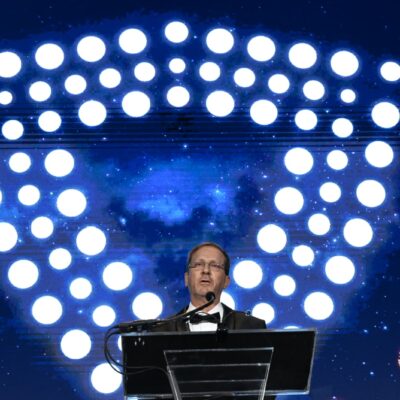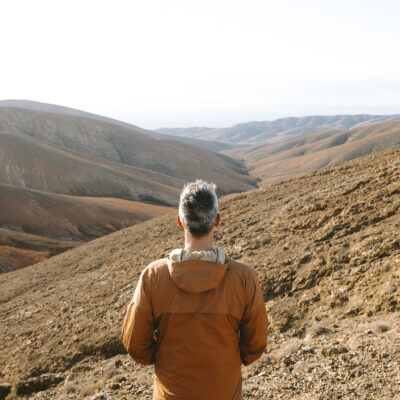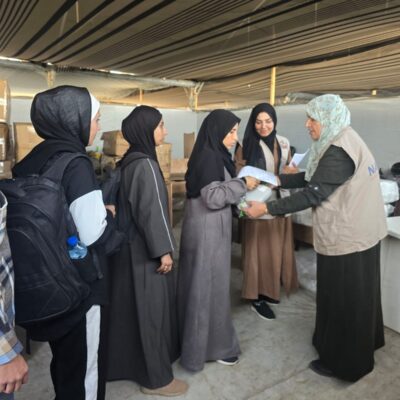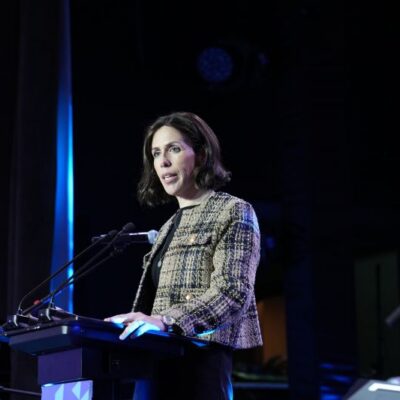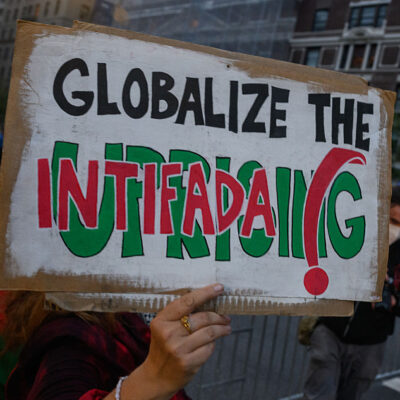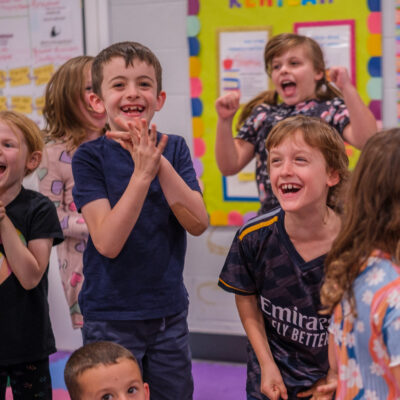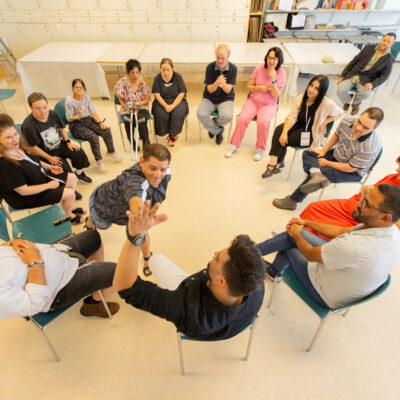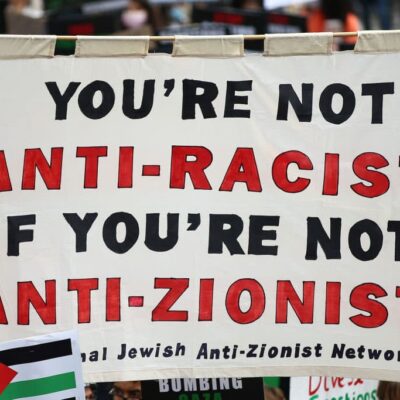Hearts in the east, Jewish Funders Network in the West: L.A. convening focuses on crisis in Israel
LOS ANGELES — Nearly 120 people representing 75 funders gathered here this week to talk about funding the Jewish future, particularly the future of Israel, at the Jewish Funders Network West convening.
The gathering, held at L.A.’s Luxe Sunset Hotel, included practical sessions from the University of Pennsylvania’s Center for High Impact Philanthropy (CHIP), but most attendees were singularly focused on Israel, with an emphasis on how philanthropy could help during wartime and into the new postwar reality.
Sideline conversations were punctuated with intermittent jokes about how no one was sleeping well, concerns about Jewish life on college campuses and how to cope with professional or personal allies calling Israel’s military actions “genocide.” During dinner on Monday night, the crowd also heard about the death of Paul Kessler, who was allegedly struck by a pro-Palestinian protester in an altercation at a protest in nearby Thousand Oaks, Calif., and suffered a fatal head wound.
At the opening session, Tzivia Schwartz Getzug, senior director of philanthropic engagement and JFN West’s senior director, said that, like an earthquake, the Oct. 7 attacks shook everything. “The ground underneath our feet has shifted, leaving us feeling off-balance and the uncertainty for our future,” she said. “Many people have said to me that they feel like we’re at an inflection point, as a Jewish community, as a Jewish state and as a supporter of liberal democracy. How we respond now, and over time, will determine the future for the State of Israel and Jews all over the world. There’s a lot we can’t control. But today we are here as Jewish funders as philanthropists with the power of our time, treasure and talent.”
In her session about high impact philanthropy and how it looks in times of crisis, Katherina Rosqueta, CHIP’s executive director, said that to make big changes, “you have to really be honest with yourself” around risk tolerance, she said.
“If you want to see concrete results soon, like within the next five years, you probably only want to fund direct service programs. If you want to build the capacity of a system, you have to have the stomach for not seeing a lot of wins for like seven to 10 years. And if you’re really interested in game-changing, then you’re gonna have to be a little like Bill Gates, who has spent billions of dollars and waited 25 years for a malaria vaccine that still isn’t even online,” Rosqueta said.
During their post-dinner “fireside chat” on Monday, Yotam Polizer, CEO of the IsraAid humanitarian organization, and Alon Friedman, CEO of Enter: The Jewish Peoplehood Alliance, shared their experiences about living in and providing aid to Israel.
“I spent a year in Sierra Leone during an Ebola outbreak, the survival rate was 50% — that was scary. I am much more terrified right now,” said Polizer, whose organization has worked in 62 countries around the world but never operated in Israel until now. “All of the work we did in all these countries prepared us for this moment. Right now.”
Between 200,000 and 300,000 people are displaced in Israel, Polizer said, some of them by government order and others of their own volition. More than 60,000 evacuees are staying in the city of Eilat, effectively doubling its pre-Oct.7 population, and tens of thousands more are in hotels around the Dead Sea. (Both of these being areas with large numbers of hotel rooms and which are less likely to come under further attacks from Gaza.) IsraAid recruited about 120 therapists and social workers and opened child safe spaces, where kids can play, do art therapy and sports; enabling them to just be kids is also therapeutic, as some of them may be more likely to draw their traumatic experiences than to tell their parents or therapists.
Polizer estimated that rebuilding would take at least two years, requiring philanthropic assistance but also significant amounts of government funding. It is not yet clear what happens until then.
“We have to think of the mid-term solution,” Polizer said. “All of us in this room should think of how we can help these communities to find a better solution. And then eventually, we hope they’ll be able to go back.”
On a positive note, Polizer said the attacks have “united and mobilized” the overwhelming majority of Israelis. “The second opportunity is related to the community here, and how this terrible tragedy could serve as an opportunity to reconnect the Jewish community to Israel, and especially the younger generation,” he said.
In his remarks, Friedman reflected the frustration and dissatisfaction that many Israelis have expressed in recent weeks toward the government, both for the initial military failures that enabled the Oct. 7 attacks to occur, as well as what is widely seen as a too-slow response by Israeli politicians and authorities to the needs of the Israeli public.
“The [Israeli] government was not there. It still mainly isn’t,” Friedman said. “The people are taking care of the people on a voluntary basis with their own money and with their own time.”
Friedman, whose organization champions the concept of Jewish peoplehood and the role of the Diaspora in Israel, called on the attendees to seize the moment to have an impact on what comes next.
“This will be an opportunity… for you guys to not let Israel be separate from your Jewish identity,” he said. “You own the place, whether it’s as shareholders or stakeholders. It’s yours as much as it is ours, and when we rebuild you need to be there.”
On Tuesday morning, participants shared dilemmas in small groups, reflecting a range of challenges. One presenter said they had more financial capacity in the community that could be activated, and they wanted to figure out how collaboration or alliances could unlock the increased capital. Another wanted to know how it could more effectively respond to a crisis; and another asked about what happens when your partners and allies for one social impact goal actually seem to be fighting against you for another.
After another two brass-tacks sessions on high impact philanthropy, led by Rosqueta and Richard Marker, both of whom serve on the faculty at CHIP, the participants split into groups to talk about of-the-moment challenges like coping with people who turn out not to be allies; how to use social media to combat antisemitism; Israeli resilience; and campus-related issues. Several participants were heard describing some of the discussions as “group therapy.”
In the afternoon, a team from the Hostage and Missing Families Forum, which formed less than 24 hours after the hostages were taken, shared their stories. Gilad, an organizational volunteer, explained that among the forum’s goals was to support the families in the struggle to release the hostages and thereafter, as well as keeping the awareness of the hostages and the demand that they be released in the headlines.
Galia, who lost her cousin and his daughter in the attack and her cousin’s wife and three children were taken, proclaimed that “we are shamelessly optimistic that we’re gonna get every single one of these people back.”
“All we do is this,” Galia said. “We just talk until we have no more saliva.” Sharing stories is “completely out of my comfort zone. [But] I gladly do it. Because these 240 hostages need a voice. They need your voice,” she said, adding, “We demand their safe return home. We demand proof of life. We demand to know where they are, what their condition is, before anything else happens. And we can’t do it alone…These people will be forever my family and so will you because we’re in this room together. And we are connected because we’re like-minded people and our mission is to be good ambassadors for this cause,” she added.
Millennials and members of Gen Z were scarce at the convening, said Heidi Monkarsh, trustee of the Jewish Community Foundation of Greater Los Angeles and vice chair of the board at the Jewish Federation of Greater Los Angeles.
“I feel like there’s a lot of conversation about our Jewish community, but half of our Jewish community is not here, specifically the under-40 crowd,” Monkarsh said. “We’re talking about students, but students aren’t in the conversation. We’re talking about antisemitism but we’re not talking about education and how to build the Jewish community that we have here so that they’ll be able to fight that fight. We’re a lot of old people that are talking about these major issues in an old way. If we want to look at it in a new way, we need to get new voices in the room. That’s for [the] Jewish community as a whole. But we can’t solve the college campus problem without students. We can’t go there and tell them what to do.”
Responding to eJP about this statement, Schwartz Getzug pointed out that several young funders and grant-makers were present, constituting almost a quarter of all attendees, and representing themselves, their family’s foundation boards or as grantmaking staff of large foundations. Others, who couldn’t take off from work to attend a two-day conference, sent colleagues in their place. And the number of millennials and Gen Z members will continue to increase, Schwartz Getzug said, bolstered by JFN bringing on a Senior Manager of Philanthropic Engagement, Hannah Bloom-Hirschberg (who attended the conference as well), to engage with rising generation family funders.
Attendee Max Baumgarten, associate director of North American Operations at The Diane and Guilford Glazer Foundation, told eJP his educated guess was that the majority of grantmaking professionals in attendance were millennials, which Pew Research defines as people born between 1981 and 1996, as well as “a handful” of young funders.
Lisa Hofheimer, executive director at the Lee Liberman Foundation, said the community needs to reach out and bring in disaffected Jews all over Los Angeles, “and probably across the country,” Hofheimer said. “They need space; they need to be part of the community. And there is a space for legacy institutions like the Jewish federation, the Jewish Community Foundation, Jewish Family Service, your local temples, for real and deep engagement right now. And I think that’s what people need more than anything at this point: to be held in community together.”

 Add EJP on Google
Add EJP on Google



